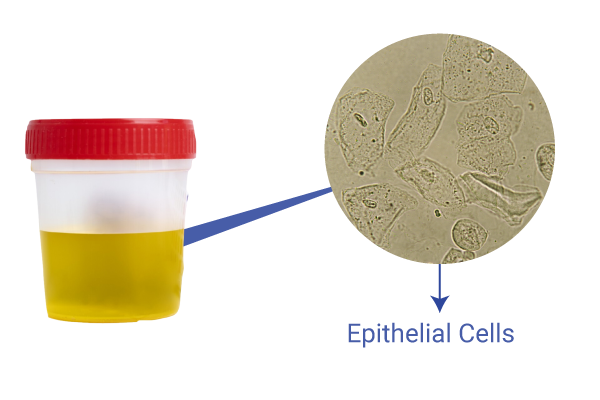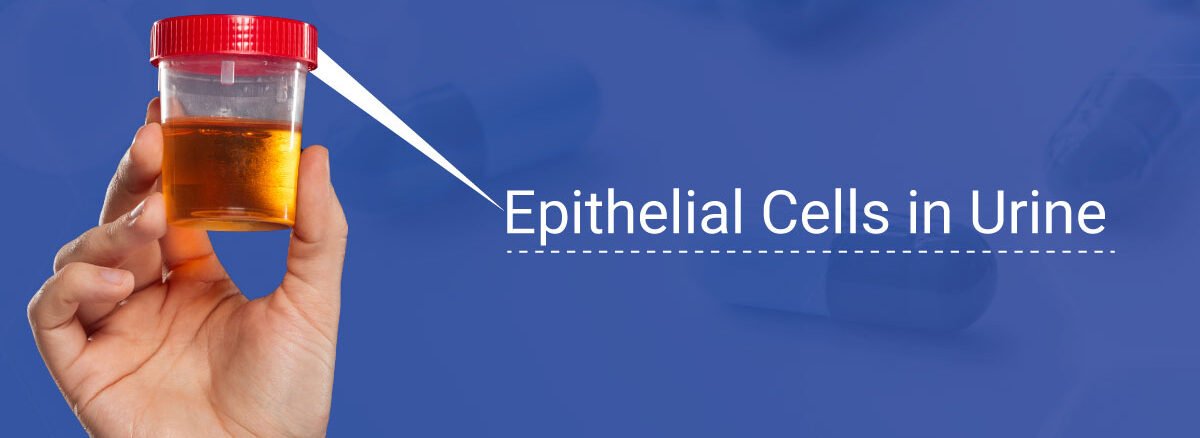When analyzing urine samples, the presence of epithelial cells can be a common finding. While their presence is not always alarming, it is essential to understand the reasons behind it. This blog will delve into the role of epithelial cells in urine, the types encountered, and what their presence might indicate about one’s health.
What Are Epithelial Cells?
Epithelial cells are a type of cell that lines the surfaces of the body, both internally and externally. They form the protective layers covering organs, cavities, and the skin. In the context of urine, epithelial cells may be shed from various parts of the urinary tract, including the bladder, ureters, and urethra.

Types of Epithelial Cells in Urine
There are three main types of epithelial cells found in urine samples:
- Squamous Epithelial Cells: These are flat cells found in the skin and the linings of the urinary and reproductive tracts.
- Transitional Epithelial Cells: These cells line the bladder and parts of the ureters and urethra. They are stretchable and can change shape as the bladder expands and contracts.
- Renal Tubular Epithelial Cells: These cells originate from the renal tubules in the kidneys.
Causes of Epithelial Cells in Urine
The presence of epithelial cells in urine can result from various factors, and understanding the potential causes is crucial for accurate interpretation. Here are some common reasons why epithelial cells may be observed in urine:
- Normal Shedding:
- Explanation: Shedding of epithelial cells is a normal and continuous process in the body.
- Details: The urethra and genital areas naturally shed some squamous epithelial cells, which can be present in urine samples.
- Urinary Tract Infections (UTIs):
- Explanation: Infections in the urinary tract can lead to increased shedding of epithelial cells.
- Details: The inflammation associated with UTIs can cause the release of transitional epithelial cells from the lining of the bladder and urethra into the urine.
- Inflammation or Injury:
- Explanation: Trauma or inflammation in the urinary tract can result in the shedding of epithelial cells.
- Details: Surgical procedures, catheterization, or other forms of trauma can cause the release of epithelial cells into the urine.
- Kidney Disorders:
- Explanation: Conditions affecting the kidneys may lead to the presence of renal tubular epithelial cells in the urine.
- Details: Glomerulonephritis, renal tubular necrosis, and other kidney disorders can result in the shedding of renal tubular epithelial cells.
- Dehydration:
- Explanation: Concentrated urine may increase the visibility of epithelial cells.
- Details: Dehydration can lead to more concentrated urine, making epithelial cells more apparent in a urine sample.
- Urothelial Disorders:
- Explanation: Disorders affecting the urothelium, the lining of the urinary tract, may contribute to epithelial cell presence.
- Details: Conditions like interstitial cystitis or other urothelial disorders can cause shedding of epithelial cells.
- Vigorous Exercise:
- Explanation: Intense physical activity can sometimes result in the release of epithelial cells.
- Details: Exercise-induced stress or trauma may lead to the shedding of cells into the urine.
- Medications:
- Explanation: Certain medications can influence urinary cell shedding.
- Details: Drugs affecting the urinary system or causing irritation may contribute to the presence of epithelial cells.
- Hormonal Changes:
- Explanation: Hormonal fluctuations may impact the shedding of epithelial cells.
- Details: Changes in hormonal levels, especially in women, can influence the shedding of cells from the urinary tract.
Risk factors for increased epithelial cells in urine
General Risk Factors:
- Age: As we age, our organs and tissues naturally degenerate, increasing the risk of minor shedding of epithelial cells.
- Sex: Women are anatomically more prone to UTIs, leading to higher potential for increased epithelial cells.
- Genetics: Some genetic predispositions can increase susceptibility to specific urinary tract conditions that lead to cell shedding.
- Medical history: Prior UTIs, kidney stones, or other urinary tract complications raise the risk of recurring issues with higher cell counts.
- Lifestyle factors: Dehydration, poor hygiene, and frequent use of bladder irritants like caffeine or alcohol can increase the risk of inflammation and cell shedding.
Symptoms Associated with Epithelial Cells in Urine
- Frequent and painful urination
- Changes in urine volume and color
- Pelvic pain and discomfort during urination
- Dark yellow urine and reduced output
- Muscle soreness and fatigue
- Pain or discomfort after surgical procedures
- Side effects related to medications
- Irritation and burning during urination
- Increased thirst and frequent urination
- Hormonal changes and urinary frequency during pregnancy
Interpreting Epithelial Cell Counts:
The presence of a few epithelial cells in a urine sample may be within the normal range. However, an elevated count may warrant further investigation. High numbers of epithelial cells could indicate an infection, inflammation, or other underlying issues in the urinary tract.
Diagnostic Steps:
- Urine Culture: To identify and treat any potential infection.
- Imaging Studies: Such as ultrasound or CT scans to visualize the urinary tract.
- Cytology: Examining the cells under a microscope to identify any abnormal or cancerous cells.
Conclusion
In conclusion, while the presence of epithelial cells in urine is often normal, persistent or elevated levels warrant attention. Consult with Dr. Saket Narnoli, a trusted urology specialist, for a thorough evaluation. Understanding the potential causes and types of epithelial cells empowers proactive urinary tract health measures. Regular check-ups, hydration, and addressing urinary symptoms promptly contribute to optimal urological well-being under the expert care of Dr. Saket Narnoli in Dhanbad.


